Dental Implants – Fort Worth, TX
Premier Dentistry Designed to Rebuild Smiles
Technology has changed many aspects of our daily life. From the way we make phone calls to the way we shop, almost everything can be done more easily thanks to technological advancements. This is also true of advanced dentistry services like dental implants, which have completely changed the way we replace missing teeth. Compared to other tooth replacements, dental implants in Fort Worth look more lifelike, feel more natural, and last much longer. To find out how you can benefit from dental implants, contact Distinguished Dental today!
Why Choose Distinguished Dental for Dental Implants?
- Dentist Who Partners with Specialists for Placement
- High-Quality Restorations Available
- State-of-the-Art Facility Designed with Patients in Mind
What Are Dental Implants?

Dental implants are an innovative tooth replacement solution. This treatment is unique in that it brings back both the root and crown of missing teeth. Traditional tooth replacements like fixed bridges and dentures only restore the crown, or part of the tooth visible above the gumline, leaving patients without the necessary dental support and stimulation they need to maintain the optimal level of oral health.
The implant itself is a small titanium, ceramic, or zirconia cylinder that replicates the root of a lost tooth. Once it’s surgically placed below the gums and into the jaw, it merges with the surrounding bone and tissue via a process called osseointegration. Then, your implant dentist in Fort Worth can install a metal abutment fixture that will allow us to place a dental crown, bridge, or denture on top in order to complete your smile.
The 4-Step Dental Implant Process

Since dental implants are a highly customizable process, a lot of planning goes into the procedure to ensure the most successful treatment outcome possible. This includes detailed exams of your mouth and jaw, the creation of personalized restorations, and routine follow-ups to monitor the implant’s healing. Our office always breaks down the procedure step-by-step ahead of time so you can know exactly what to expect as you undergo your tooth replacement. You can read about this process in more detail below!
Initial Dental Implant Consultation
Before we can place dental implants, Dr. McIntosh will perform a detailed examination of your mouth and capture X-rays of your jawbone to confirm if dental implants are right for you. She’ll also make sure you have sufficient oral and overall healtrooh. For example, you should not have gum disease or tooth decay, both of which will require additional treatment before implants can be placed. If you have reduced bone volume that makes you ineligible for dental implants at this time, a bone graft can be performed and given time to heal. This will ensure you can receive dental implants at a later date.
Dental Implant Surgery
For the first phase of the dental implant process, we partner with a highly trained, board-certified oral surgeon who will place your implants. Working with an oral surgeon for implant placement ensures the most successful outcome for your dental implants.
During the procedure, a small incision is created in your gum tissue so a tiny hole can be made in the jawbone. After the implant is placed and secured, the gums are stitched closed so the integration process can begin.
Dental Implant Osseointegration & Abutment
Once the implant post is in position, patients will need to wait three to six months to allow the implant to fuse with the gum and bone tissue through a process called osseointegration, which allows the implant to mimic the function of natural tooth roots. Once the dental implant post has fully fused with the jawbone, you will have your abutment put in place so that it can eventually hold your replacement tooth or teeth. To do this, the gum tissue is opened back up and the abutment is attached. After it is closed, the tissue will be given a few more weeks to heal around the implant and abutment.
Delivery of Dental Restoration(s)
At your final appointment, we’ll attach the permanent restoration to the top of your abutment. The abutment is an important component for your tooth replacement because it provides the restoration, whether it’s a crown, bridge, or denture, the stability it needs to withstand regular biting and chewing. It also ensures your restoration does not slip or shift out of place, which is something that should never occur with your dental implant. Our implant restorations are made from durable, color-matched, natural-looking dental ceramics to ensure your smile looks as beautiful as possible.
Benefits of Dental Implants

As the only tooth replacement option to reconstruct every portion of lost teeth, dental implants are often considered the gold standard of tooth loss treatment. They essentially fulfill all of the functions that natural teeth do, allowing them to improve your confidence, health, and overall quality of life in ways that conventional dentures and dental bridges simply cannot. Below, you can read more about the benefits of dental implants in Fort Worth and how they can transform your life in ways you never thought were possible!
Day-to-Day Benefits
- Restored bite – Unlike bridges and dentures, dental implants are firmly embedded in the jaw. Therefore, you can trust that your teeth will remain in place no matter what you’re eating. Plus, implants bring back almost all of your original chewing power, so feel free to dig into all of your favorite foods!
- Flawless appearance – When you look at a dental implant right next to a real tooth in someone’s mouth, you almost certainly won’t be able to tell them apart. That’s because each implant is topped with personalized restorations that are designed to perfectly mimic natural tooth enamel.
- Easy maintenance – In terms of daily hygiene, caring for dental implants is almost exactly the same as taking care of natural teeth. All you have to do to keep your new smile strong and healthy is brush and floss every day and regularly visit your implant dentist in Fort Worth for checkups.
Health Benefits
- Jawbone preservation – Currently, dental implants are the only tooth replacement that can stop and even reverse the jawbone deterioration that occurs after teeth have been lost. Not only does this maintain a strong foundation for your remaining teeth, but it also prevents your face from prematurely wrinkling due to a weakened jawbone.
- Protection of your natural teeth – Placing a dental implant doesn’t require your natural teeth to be modified for support, unlike placing a dental bridge. Additionally, implants keep your remaining teeth from drifting out of position after tooth loss.
- Greater comfort – Dentures are notorious for causing sores and irritation as they rub against the gums. Dental implants won’t do this, resulting in greater comfort; in fact, dental implants are often so comfortable that many patients forget they even have them!
Long-Term Benefits
- Results you can trust – With a success rate of more than 95 percent, dental implants in Fort Worth are truly the most reliable method of replacing missing teeth.
- A solution that is built to last – As long as you take good care of them, dental implants can last for several decades – potentially even a lifetime! This actually makes them more cost-effective in the long run than bridges and dentures that must be replaced every five to ten years on average.
Who Dental Implants Can Help

Most people with healthy mouths and at least one missing tooth can be considered potential candidates for dental implants. Our team will be more than happy to help you figure out whether this tooth replacement option is right for you; all you need to do is schedule a consultation at our office. Once we’ve taken a closer look at your smile, we can figure out your unique needs and use that information to create a customized treatment plan.
Who Is a Good Candidate for Dental Implants?

Your oral health matters when it comes to your candidacy for dental implants. Certain oral health issues such as gum disease can potentially lead to dental implant failure; as such, these types of problems need to be identified and properly treated before you can receive your implant posts.
The level of bone density in your jaw is also an important factor. Without a sufficient amount of bone tissue, your jaw won’t be able to give your implant posts the support they need. That said, even people who have experienced bone loss in their jaws can often still get dental implants after bone grafting.
Missing One Tooth

If you have only lost one tooth, the now-empty socket can be filled with a dental implant post. After said post finishes forming a lasting bond with the jawbone, it will be able to support a dental crown, which will be made out of materials that will allow it to match the appearance of the rest of your smile.
When it comes to single-tooth replacement, an implant post topped with a crown can be a great alternative to a traditional dental bridge. Because a traditional bridge uses your natural teeth for support, it would require us to remove some of your enamel. With a dental implant, this step is unnecessary, allowing you to preserve more of your natural smile.
Missing Multiple Teeth

It’s generally best to use as few dental implant posts as possible to help you reclaim a complete smile. Thus, if you have lost multiple teeth in a row, you don’t have to worry about getting a separate post for each tooth. Instead, we can fill in the gap with a personalized dental bridge supported by a pair of dental implants. On top of that, we can replace missing teeth that were in different parts of the arch with a partial denture anchored to a strategic number of implant posts.
Missing All Teeth
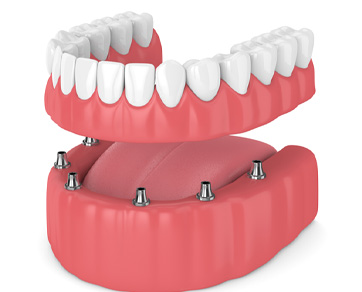
Even if you have lost all of the teeth in your upper or lower jaw, we can replace them all at once with an implant denture. This form of tooth replacement usually requires around 4 to 6 implant posts, although the exact number depends on the needs of the patient.
Implant dentures offer better chewing power and stability than traditional dentures, allowing you to enjoy a wider range of foods. Additionally, while some implant dentures are removable, others are fixed in place, allowing you to brush them as if they were a natural part of your mouth.
Understanding the Cost of Dental Implants

When it comes to paying for your dental implants, it’s important to remember that seeing a trusted professional and ensuring only the best materials are used will increase your chances of enjoying a healthier, more beautiful smile for years to come. This worthwhile investment not only positively impacts your oral health, but it can also make a significant difference in your confidence, quality of life, and overall health and well-being. There are many factors we must consider before formulating a cost estimate for your treatment, which is why a consultation is necessary. Below are just a few key factors you can expect to be incorporated into your overall cost of dental implants.
Preliminary Treatments & Dental Implant Surgery

During your consultation with Dr. Sheri McIntosh, she will examine your smile and determine if any preliminary treatments are necessary. These can include tooth extractions, periodontal therapy, or even bone grafting. Not all individuals looking to have dental implants placed will need this additional treatment; however, if you lack enough bone density, have a decayed tooth that requires extraction, or suffer from gum disease, you can expect these services to add to the overall cost of your treatment.
Not to mention, the actual surgery and placement of your implants will also be figured into the full amount. Dr. McIntosh works closely with an oral surgeon who will place your implants, but remember, since you will be seeing another individual for surgical placement, you will incur two separate fees: one to the surgeon and the other for the implant restoration you will receive at our office.
The Parts of Your Dental Implant
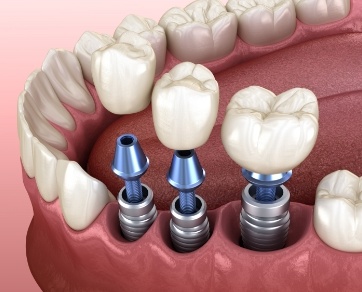
Receiving implants made from high-quality materials can make a difference in how long they will last. Titanium posts are most commonly used, as they are known to easily fuse with the bone. The materials and manufacturer used by your dentist are considered in the overall cost of your treatment. Although you may want to lower your total bill by opting for less expensive materials, this is not a good idea, as you won’t receive the same great result, and can potentially cost you more money in the future should your implants fail.
During your consultation, Dr. McIntosh will go over the materials used as well as which brand she works closely with so that you are fully informed and capable of determining if dental implants at Distinguished Dental are right for you.
Final Dental Implant Restoration
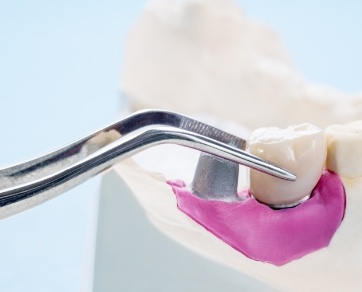
At Distinguished Dental, our team uses porcelain restorations to complete your smile. Whether you need a dental crown, dental bridge, or implant denture, we can have a customized restoration created that will blend in and give you the full, complete look you desire. Naturally, a custom-made crown will be less expensive than a denture, so the type of restoration you need will impact the cost of your treatment as well.
Does My Dental Insurance Cover Dental Implants?

Before you agree to move forward with dental implant treatment, you should check with your dental insurance company to find out if they cover any or all dental implant placement. Most insurers do not offer coverage for this type of care; however, they may pay for other aspects of treatment including your restoration, consultation, or even preliminary treatments.
Whether you prefer to reach out to a representative from your insurance company or ask a member of our team to work on your behalf, it is important that you get the information you need to determine how you will pay for your treatment.
Making Dental Implants Affordable

If dental insurance is not an option, do not worry. There are other ways to pay for your dental implant placement without emptying your savings account. At Distinguished Dental, we are pleased to work closely with CareCredit and Springstone, two companies dedicated to providing flexible financing to eligible individuals. These third-party financiers make it possible to afford complex dentistry services like dental implants by offering low- and no-interest payment plans. This way, you can stay within your budget and be well on your way to a new and improved smile.
Dental Implant Post-Op Instructions
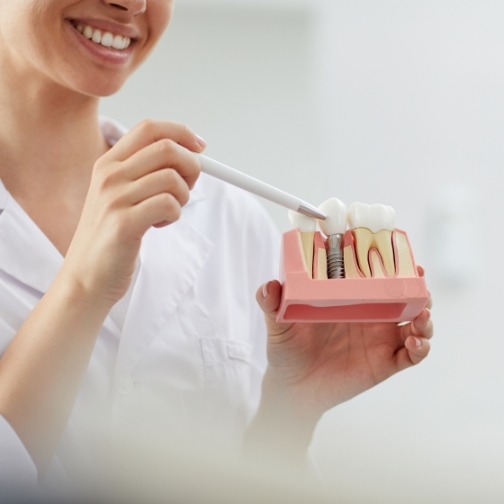
Once your dental implants are placed, you’ll need time to allow them to heal. During this recovery process, you don’t have a lot to worry about. The overwhelming majority of people complete it without any trouble. Of course, you’ll still want to take note of certain post-op instructions recommended by our office and common side effects that can develop. If you ever notice intense or abnormal pain as well as other strange side effects that aren’t mentioned below, please give us a call right away.
What to Do Directly After Dental Implant Surgery
One of the most important things you can do following dental implant surgery is to protect the blood clot that forms over the implant site. To prevent disturbing the clot, be sure to avoid:
- Spitting (instead, use tissues to catch excess saliva, or just swallow it)
- Using straws (especially over the next 48 hours when the implant site is most sensitive)
- Smoking or using tobacco (which can negatively impact healing)
- Touching the surgical site (either with your fingers or your tongue)
Common Side Effects
Mild side effects are very normal following dental implant surgery. The most common ones to look out for include:
- Intermittent bleeding – This can be managed with light pressure using a gauze pad. Light bleeding is normal over the next few days.
- Swelling – You can manage facial swelling over the next 72 hours using a cold compress.
- General discomfort – You’ll be asked to take prescribed painkillers as needed to manage any pain (which should be mild at worse).
Don’t worry; these symptoms should go away gradually over the next few days. If they do not get better, please call us immediately.
Your Diet After Surgery
It helps to have food at home already following your oral surgery, so you don’t need to go to the store when you leave our practice. Good foods to have on hand include the following:
- Mashed potatoes
- Oatmeal (cold)
- Applesauce
- Yogurt
- Ice cream
- Pudding
- Soup (cold soups only)
- Scrambled eggs
- Pasta
The most important thing you can do is avoid hard, tough, or crunchy foods. Avoid chewing directly on the implant site as well whenever possible.
Post-Op Health and Oral Hygiene
You’ll be able to brush your teeth the day after your surgery. However, you should use caution around the surgical site. Rinse your mouth out at least two to three times a day either with salt water or an oral rinse recommended by our office. Do not use mouthwashes that contain alcohol as these can cause dry mouth and negatively impact healing.
What to Do After Receiving Your Dental Implant Restoration
Congratulations! Once you’re able to receive your permanent restoration, you’ve already completed all the most difficult steps of your tooth replacement process. Once your crown, bridge, or denture is attached, you may notice some minor, temporary sensitivity around the gum tissue. Thankfully, you can manage these symptoms easily with painkillers. There should not be any swelling or bleeding present, or extensive recovery needed.
Maintaining & Caring for Your Dental Implants

If you want to maximize the lifespan of your dental implants, then you need to learn the right steps for taking care of them. Proper maintenance is essential for getting as many years of use out of your implant posts as possible. Our team will be more than happy to give you whatever tips you need in order to keep your newly rebuilt smile in excellent condition. Here’s a brief overview of the basics of dental implant maintenance that all patients should keep in mind.
Make Oral Hygiene a Priority

Your dental implant posts rely on healthy gum and bone tissue to help them stay anchored in place. If these tissues are attacked and weakened by harmful oral bacteria, it could ultimately cause your implant posts to fail. As such, good oral hygiene is an essential part of dental implant maintenance. Be sure to brush and floss the area around your implant posts thoroughly at least two times every day. To be as safe as possible, it’s recommended that you rinse with antibacterial mouthwash as well.
Eat a Healthy Diet

The foods you eat can have a significant impact on the well-being of your dental implants. Fruits, vegetables, dairy products, and lean proteins can all go a long way toward helping you maintain a healthy mouth where your implant posts can last a long time. On the other hand, you should try to limit your exposure to foods that contain a lot of sugar or starch, as they can raise your risk for oral health issues that can lead to dental implant failure.
Break Bad Habits

Despite their high durability, dental implants can still be damaged if you put too much pressure on them. It’s therefore important to avoid biting your fingernails, chewing on pen tips, crunching ice cubes, and engaging in any other habits that can potentially be hard on your implant posts. Make sure you’re aware of any habits that could be causing issues for your newly rebuilt smile so that you can take the appropriate steps to correct them as soon as possible.
Protect Your Dental Implants
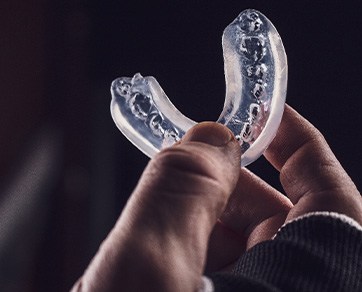
Do you play any sort of sport that comes with a high risk of getting hit in the face or jaw? If so, you should make sure that your dental implants are well-protected, should the worst ever happen. Wearing a customized athletic mouthguard can go a long way toward keeping your newly rebuilt smile safe.
On top of that, if you suffer from nighttime bruxism, you may want to think about getting a nightguard. By wearing this simple device to bed, you can protect your dental implants and the rest of your smile from the pressures of grinding and clenching.
Schedule Regular Dental Checkups

Every six months, you should make room in your schedule for a routine dental checkup and cleaning. During this appointment, your dentist can check on your dental implants to see if there are any problems that might have started developing without you realizing it. Addressing these issues while they’re still small can help you avoid more serious complications later on.
Dental Implant FAQs
Dental implants in Fort Worth are a lifelong commitment to replace missing teeth. It’s normal to have several concerns before you’re ready to invest in them. We will explain everything during your dental implant consultation to feel confident in the decision you are making for your smile. Here are the answers to a few frequently asked questions to ease any apprehensions until your appointment.
Are dental implants removable?
Dental implants are popular because they are the next best thing to your real teeth, and not just aesthetically. A dental implant is the only treatment to replicate both the root and crown. A titanium post is surgically placed into your jaw to serve as a root. Your bone will fuse to it through a process called osseointegration. Therefore, only a trained implant dentist in Fort Worth can remove dental implants; however, some implant dentures can be taken out for cleaning.
Am I too old for dental implants?
You are never too old for dental implants. Age doesn’t determine your candidacy for dental implants. Instead, your oral and general health are the most influential factors. Since certain health conditions go hand in hand with aging, like cardiovascular disease or diabetes, your implant dentist will take precautions to ensure your safety and the success of your new smile. Besides your overall health, you must have enough bone in your jaw to support the posts. If you’ve lost bone density, don’t worry. Your dentist will create a personalized strategy to provide your dental implants with the support they need.
How long do dental implants last?
You won’t have to put money aside to pay for replacements every few years as you do with traditional bridges and dentures. Dental implants are proven to last for decades with the right care. Although various factors affect their lifespan, oral health and lifestyle habits are influential. You can ensure your investment lasts for 30 years or more by brushing, flossing, and using a mouth rinse daily. Don’t skip your semi-annual appointments for a cleaning and checkup. While your dental implants will be strong, they aren’t indestructible. It’s best to avoid anything that may damage them, like using them as tools or chewing on inedible objects. If you have a habit of grinding or clenching your teeth, ask your dentist for a nightguard to protect your dental implants from failure.
Are dental implants painful?
You will need oral surgery to place your posts in your jaw, but you don’t have to stress about a painful procedure. Your jawbone doesn’t have any nerve endings. Not to mention, sedation or anesthesia is used along with a local anesthetic, so you won’t feel any pain during your placement surgery. After the medications wear off, your mouth will be a little sore for a few days. You can manage it using prescribed or OTC pain relievers. Applying an ice pack to the outside of your mouth can also reduce pain, swelling, and bruising. It’s best to stick to softer foods until your discomfort subsides.
